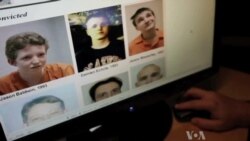In 1993, three young boys were killed and mutilated in West Memphis, Arkansas. Three troubled teenagers were convicted for the crime and put behind bars for 18 years. It turns out, though, that their prosecution was tainted. Although the Arkansas prosecutor declined to comment, Amy Berg says her recent documentary, West of Memphis, points to a flawed justice system and presents fresh evidence about new suspects.
Damien Echols, Jessie Misskelley and Charles Jason Baldwin were accused of the crime. Their conviction, it turned out, was based on questionable evidence and false testimonies.
The widely publicized trials attracted the attention of filmmakers. In 1996, Paradise Lost was the first documentary to question whether justice had been served.
“There were 15 years of evidence and new information," said Amy Berg, whose 2012 documentary West of Memphis not only follows the case since then, but presents new evidence that focuses on Terry Hobbs, the stepfather of one of the three slain children. Berg says he has been identified though a DNA match and interviews with family members. She argues that the three convicted men should be pronounced innocent.
“I think the documentary stands alone as a reason to exonerate them and to prosecute the real killer. So we hope that the film can stand as the testament,” Berg said.
While Hobbs denies any involvement, in 2011, the state of Arkansas agreed to release but not exonerate them.
Damien Echols, who had been sentenced to death by lethal injection, said to get out of jail, the three had to take what is called the Alford Plea.
“Most Americans haven’t even heard of it. What it means is you’re still maintaining your innocence. You’re saying ‘I did not commit this crime,’ but you are accepting their 'guilty plea.' And a lot of the reason for it is so that the state cannot be held accountable for what they’ve done,” Echols said.
As a result, says Echols, he and the other two still bear the stigma of murder.
“I have three counts of murder on my record. The guy who went to trial with me, Jason Baldwin, he’s currently in school. He wants to get his law degree and help people with the same situation we were in. But he can’t practice law with a criminal record,” Echols said.
Maryland Defense attorney Rene Sandler says, often, in high profile cases such as the murder of children, the prosecution feels pressured to convict someone, anyone.
“Political careers were made, reputations were made, the prosecutor dug in to whatever theory he believed at the time. And the police and the judge and everyone really were invested in the prosecution and the convictions of these three people without ever looking anywhere else,” Sandler said.
The state of Arkansas has refused to reopen the case.
"I believe it would be practically impossible after 18 years to put on a proper case against the defendants," said Akansas prosecuting attorney Scott Ellington, in the documentary. He did not respond to a VOA request for further comment.
But West of Memphis, the documentary, has opened cracks in the prosecution's argument. Recent hearings could point to a new trial for the three.
Damien Echols, Jessie Misskelley and Charles Jason Baldwin were accused of the crime. Their conviction, it turned out, was based on questionable evidence and false testimonies.
The widely publicized trials attracted the attention of filmmakers. In 1996, Paradise Lost was the first documentary to question whether justice had been served.
“There were 15 years of evidence and new information," said Amy Berg, whose 2012 documentary West of Memphis not only follows the case since then, but presents new evidence that focuses on Terry Hobbs, the stepfather of one of the three slain children. Berg says he has been identified though a DNA match and interviews with family members. She argues that the three convicted men should be pronounced innocent.
“I think the documentary stands alone as a reason to exonerate them and to prosecute the real killer. So we hope that the film can stand as the testament,” Berg said.
While Hobbs denies any involvement, in 2011, the state of Arkansas agreed to release but not exonerate them.
Damien Echols, who had been sentenced to death by lethal injection, said to get out of jail, the three had to take what is called the Alford Plea.
“Most Americans haven’t even heard of it. What it means is you’re still maintaining your innocence. You’re saying ‘I did not commit this crime,’ but you are accepting their 'guilty plea.' And a lot of the reason for it is so that the state cannot be held accountable for what they’ve done,” Echols said.
As a result, says Echols, he and the other two still bear the stigma of murder.
“I have three counts of murder on my record. The guy who went to trial with me, Jason Baldwin, he’s currently in school. He wants to get his law degree and help people with the same situation we were in. But he can’t practice law with a criminal record,” Echols said.
Maryland Defense attorney Rene Sandler says, often, in high profile cases such as the murder of children, the prosecution feels pressured to convict someone, anyone.
“Political careers were made, reputations were made, the prosecutor dug in to whatever theory he believed at the time. And the police and the judge and everyone really were invested in the prosecution and the convictions of these three people without ever looking anywhere else,” Sandler said.
The state of Arkansas has refused to reopen the case.
"I believe it would be practically impossible after 18 years to put on a proper case against the defendants," said Akansas prosecuting attorney Scott Ellington, in the documentary. He did not respond to a VOA request for further comment.
But West of Memphis, the documentary, has opened cracks in the prosecution's argument. Recent hearings could point to a new trial for the three.





